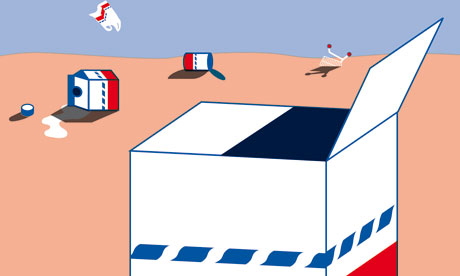Tesco's poor results have led it to review its practices. The self-service tills used by Wozza may be a good place to start

Illustration by Otto
Sad news for Tesco, which this week discovered an unexpected item in its bagging area. The rogue element has since been identified as "awful Christmas sales and a profits warning", and the company's chief executive Philip Clarke now appears to be having problems removing this item before continuing with Tesco's hitherto unstoppable rise. I do hope he has to wait a long time for assistance.
Britain ceased to be a nation of shopkeepers some time ago, as the local independent stores had the life bled out of them by the supermarket giants. But we're a nation of shoppers, and perhaps this two fingers to the daddy of them all is our retail version of the Arab spring. Watching the suddenly humble Clarke promising to address product quality, customer service and "longstanding business issues" rather put one in mind of a besieged dictator. "Wait!" is the despot's reaction to increasingly volatile protests. "I am literally just about to introduce a raft of democratic reforms!"
It will take rather more than Clarke's needy mea culpa to reverse the perception that Tesco stands for everything that is monolithic, mercilessly expansionist, and machine driven. Tesco is a place that people more principled than myself probably manage to avoid entirely, but into which most of us feel compelled to go fairly frequently because it's nearby, or because it has effectively shut down any alternatives.
For a long time, criticism of it was crushed by that pat little assertion that it was "what the people wanted". Tesco executives and their defenders appeared to be graduates of the Richard Desmond school of debate, which is to paint anyone who questions your methods as snobs or enemies of enterprise. They acted as if everyone criticising Tesco must have the luxury of shopping at Waitrose or M&S, when this week's evidence has revealed that they might just as easily get their goods at Aldi or Lidl.
Thus the unthinkable has happened. And now that Tesco appears to be not so much what the people want, what precisely does it have going for it?
Its expansion has certainly told us little we did not already know about this septic isle, merely throwing into even sharper relief the iniquities of such institutions as council planning departments. Countless ordinary citizens have tales of their applications to make minuscule home improvements being rejected, while mock Tudor Tesco superstores are waved through with as many clock towers and metal-effect weather vanes as their architects care to spike them with. Since the 90s, 200 have been plonked down like spaceships, pulling customers off high streets with their seemingly irresistible tractor beams. Yet we now discover that these behemoths are among the "less potent" parts of Tesco's enterprise. Whether scarcely 15 years of rapacious profits was worth leaving a blight of potential white elephants scattered across the countryside, only time will show.
But it is in the area of employment, and its effect on customer service, that the Tesco modus operandi has been most pernicious. There are few sights in modern retail more pathetic, in the true sense of that word, than that of the lone, low-paid human charged with overriding technical glitches in the banks of self-service tills that have already claimed the jobs of countless check-out assistants, knowing that they will soon enough claim theirs. (Eighteen months ago, Tesco began trialling a stall with no manned checkouts at all, merely the single overseer.) Given the Japanese government is investing heavily in technology that could provide robot care for the elderly, it seems a likely bet that Tesco hopes one day to have its shelves robotically stacked, and even the automated till supervisors replaced by customer service droids. A similar process of dehumanisation has been afoot in car plants, but few of us have the occasion to pass through those very often. Nowhere is the rise of the machine at the expense of human employment more evident than in supermarkets such as Tesco. It is an everyday dystopia.
What is to be done? Oddly enough, perhaps one mad answer lies in the other Tesco-related story of the week. Just possibly – and obviously entirely unwittingly – shoplifting chef Antony Worrall Thompson has suggested an act of civil disobedience. If a critical mass of shoppers were to decide to do a Wozza for moral reasons, then the robotic scanners would become less economically viable than human checkout workers. Pilfering from Tesco would become a political act. However, if your preference is for grandiose schemes that won't involve accepting a police caution before embarking on psychiatric treatment, perhaps we could get up a campaign for a sort of Tesco Tobin tax, in which some tiny percentage of every penny spent in one of their out-of-town stores would be dedicated to reviving Britain's denuded high streets.
That, of course, is about as likely to happen as one of Tesco's machines accepting you've placed your 25g packet of parsley in the bagging area. Alas, Britain's biggest retailer is such a massive part of our economy that it presumably won't be long before someone is explaining that it is too big to fail, in keeping with the vogue for the most rampant capitalists becoming socialists in their many hours of need.


